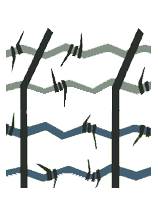|
On April 1st 1933, two months following the Nazi’s
power grab, Jewish businesses are boycotted throughout Germany, all Jewish
civil servants are fired, Jewish doctors as well as lawyers are threatened… and
Jewish performers are banned from appearing.

With the latter, in a single stroke, some 8’000
Jewish actors, musicians, singers, directors and stage as well as
concert technicians summarily lose their livelihood.
That the Nazis never envisioned the side
effects of this interdiction is evident from the retrospective remarks
made three years later by senior Propaganda Ministry official, Reichskulturwart Hans Hinkel:
"Whoever knows to what an unbelievable extent
theater-life in Germany at the time was infested, can
see how many
Jewish artists were forced to face the
dilemma of where they henceforth
would work… It’s no
wonder that – following our ascension to political
power
in 1933 – when we began cleansing the Jews from our
German
Artistic and cultural life - the question was
raised of what should
become of all these numerous
Jewish artists."
At that time, the new fascist regime still was
concerned about its reputation and image abroad, and that these would
suffer from the scandal of massive Jewish unemployment. They therefore,
welcomed the June 2nd 1933 request from Kurt Singer,
a World War I officer in the Berlin medical corps, and now representative of the Berlin
State Opera, to rule favorably on the creation of a “German Jewish
Cultural Union” (Deutsch-Jüdischer Kulturbund), a plan elaborated by
Singer in collaboration with stage director Kurt Baumann and supported
by the main Jewish organizations.
Singer had sent his original request to establish
this organization to various ministries and instances within the regime.
But Prussian Minister-President, Hermann Göring responded via the
Science, Art and National Education Ministry (Wissenschaft, Kunst und
Volksbildung) in the person of Hinkel… whom he’d recently appointed to
head the Prussian Theater Commission.
Kurt Singer also received replies from the Police
Presidium and from the president of the Theater Chamber of the Reich’s
Propaganda Ministry. However, contrary to the others, Hinkel alone
followed through.
Indeed, Hinkel’s priority was to cleanse Prussia of
all Jewish academic as well as cultural instances; and he recognized
that driving all Jewish entertainers and related personnel into a single
organization would greatly speed up the successful completion of his
plan. Additionally, Hinkel understood that control of a massive Jewish
cultural operation could represent an enormous career opportunity for
him… as indeed it would, including in 1935 being named Head of the
Reich’s Culture Chamber.
Kurt Singer and the other founders were aware of the
danger that the organization would be exploited by the Nazi regime
for propaganda purposes. However, in the light of the current massive
unemployment problem, they decided in favor of “doing what could still be
done at this point”. |
|

In 1935, homesick for his native
land, Max Ehrlich returns to Nazi Germany. Besides, Jewish entertainers
once again may perform there, even if only within the framework of the
Jüdische Kulturbund (Jewish Cultural Union) and exclusively in
front of Jewish audiences. Max Ehrlich is named director of the
Bund`s light theater department.
The KuBu or Jüdischer Kulturbund,
(Cultural Union of German Jews) was created in 1933 with the consent of
the Nazi Authorities. It was set up following the Nazi exclusion of all
Jewish Germans as well as Germans of Jewish descent from participating
in almost any other organization or public event, including theaters,
concerts, cabarets, etc. or in other public venues as well as places..
 The KuBu hired over 1300 men and 700 women
artists, musicians and actors... and grew to a membership of some 70,000
persons who participated in the organizations events. The KuBu hired over 1300 men and 700 women
artists, musicians and actors... and grew to a membership of some 70,000
persons who participated in the organizations events.
Originally named Kulturbund der Deutschen Juden (Cultural Union of German Jews, in April 1935 the
Nazi authorities forced them to remove the term "German" from the name,
imposing in its place Jüdischer Kulturbund (Jewish Cultural
Union).
The Kulturbund staged theatrical
performances, concerts and operas, as well as held exhibitions and
lectures throughout Germany, performed by Jewish entertainers, artists,
writers, scientists etc.. exclusively in front of Jewish audiences in
segregated venues.
Even following the November 9th-10th
1938 pogrommes, the KuBu was permitted to continue its activities;
however, by then, the discrimination and persecution of Jews had driven
many into impoverishment, so that the number of venues, performers and
speakers, as well as the number of members, sharply declined.
Following the 1938
pogrom, Max Ehrlich decides to leave Germany definitively. Both of his
farewell performances immediately sell out and a third presentation
is added. Thus, on April 2nd 1939, before a full house of fans,
calling out their affection and encouragement, Max Ehrlich makes his
final appearance in Germany. He returns to Holland and joins Willy
Rosen and his Theater der Prominenten (Theater of Celebrities)
where, even during the Nazi occupation, Max Ehrlich remains.
|
|
|
|
|

